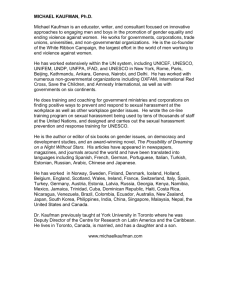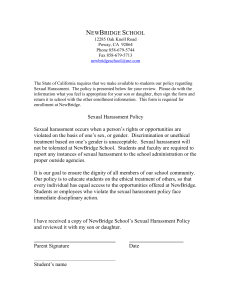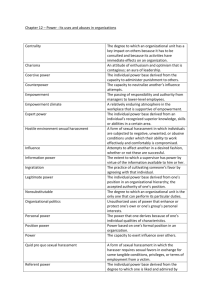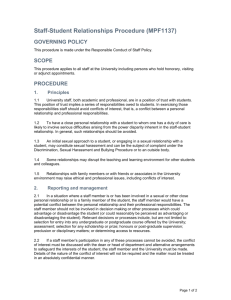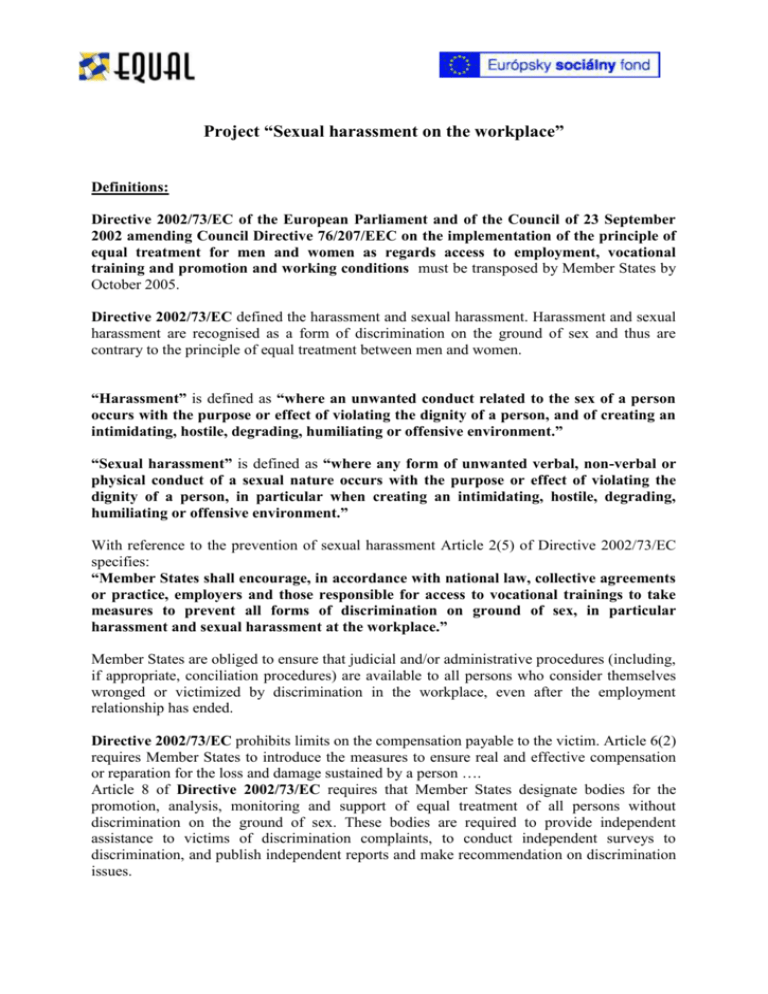
Project “Sexual harassment on the workplace”
Definitions:
Directive 2002/73/EC of the European Parliament and of the Council of 23 September
2002 amending Council Directive 76/207/EEC on the implementation of the principle of
equal treatment for men and women as regards access to employment, vocational
training and promotion and working conditions must be transposed by Member States by
October 2005.
Directive 2002/73/EC defined the harassment and sexual harassment. Harassment and sexual
harassment are recognised as a form of discrimination on the ground of sex and thus are
contrary to the principle of equal treatment between men and women.
“Harassment” is defined as “where an unwanted conduct related to the sex of a person
occurs with the purpose or effect of violating the dignity of a person, and of creating an
intimidating, hostile, degrading, humiliating or offensive environment.”
“Sexual harassment” is defined as “where any form of unwanted verbal, non-verbal or
physical conduct of a sexual nature occurs with the purpose or effect of violating the
dignity of a person, in particular when creating an intimidating, hostile, degrading,
humiliating or offensive environment.”
With reference to the prevention of sexual harassment Article 2(5) of Directive 2002/73/EC
specifies:
“Member States shall encourage, in accordance with national law, collective agreements
or practice, employers and those responsible for access to vocational trainings to take
measures to prevent all forms of discrimination on ground of sex, in particular
harassment and sexual harassment at the workplace.”
Member States are obliged to ensure that judicial and/or administrative procedures (including,
if appropriate, conciliation procedures) are available to all persons who consider themselves
wronged or victimized by discrimination in the workplace, even after the employment
relationship has ended.
Directive 2002/73/EC prohibits limits on the compensation payable to the victim. Article 6(2)
requires Member States to introduce the measures to ensure real and effective compensation
or reparation for the loss and damage sustained by a person ….
Article 8 of Directive 2002/73/EC requires that Member States designate bodies for the
promotion, analysis, monitoring and support of equal treatment of all persons without
discrimination on the ground of sex. These bodies are required to provide independent
assistance to victims of discrimination complaints, to conduct independent surveys to
discrimination, and publish independent reports and make recommendation on discrimination
issues.
Slovak Republic
The Labour Code (Article 13) defines harassment as a form of prohibited discrimination,
which consist of “Undesired conduct with the intention or effect of contravening human
dignity which causes for the employee hostile, threatening, embarrassing, degrading offensive
environment”. The wording “harassment” is using rather than “sexual harassment”.
The Slovak authorities are explaining that the definition covers also same-sex sexual
harassment and transsexualism/transgenderism.
Slovak Republic has not other legislation or other statutory provisions which are relevant to
sexual harassment/ harassment based on sex.
Here is no working definition for sexual harassment/ harassment based on sex in employer
organisations or trade unions.
Collective Agreement do not define sexual harassment or harassment based on sex.
Slovakia has none Code of Practice dealing with sexual harassment/ harassment based on sex.
(For explanation: Code of Practice dealing with sexual harassment/ harassment based on sex
could be “a guide provide practical guidance to employers´ organisations, trade unions and/or
employees on a specific issue“.
It seeks to promote the development and implementation of policies and procedures in the
issue of sexual harassment/ harassment based on sex.)
Legal complaints and remedies: Labour Inspectorate services, Office of Labour, Social
Affairs and Family and trade unions and other NGO´s can provide legal assistance and
support to complainants. Trade unions and other NGO´s can also act on behalf of victims with
their approval.
According to the Labour Code the employer is obliged to create working conditions for
successful performance of the work tasks by employee enabling safe work. The employer is
responsible for taking appropriate and reasonable measures to protect employees. An
employer may not discipline or disadvantage an employee for having attempted to enforce his
or her employment rights.
For comparison:
Italy
Italy has a Code of Conduct in the Fight against Sexual Harassment for Employees on the
Ministry of Labour (prepared in 1999). A Code of Conduct for the Personnel of the Civil
Administration of the Ministry of the Interior with regard to the measures to take the Fight
against Sexual Harassment in order to guarantee the Protection of the Dignity of Men and
Women in the Working Environment was prepared in 2003. Both these Codes are legally
binding.
The definition of sexual harassment applying in these Codes of Practice is:
1. Every unwanted action or behaviour, non-verbal or verbal, which has a sexual
connotation or is baed on sex and which, in itself or because of the perpetrator´s
persistence, causes offence to the dignity and liberty of the persons who suffers it, or is
liable to create an intimidating, hostile or humiliating working environment for them.
2. In particular, conduct such as the following amounts to sexual harassment:
a) explicit or implicit requests for sexual services or attention of a sexual nature
which are unwelcome and offensive for those who are subjected to it;
b) threats, discrimination and intimidation suffered as a result of repelling sexuallybased conduct which directly affect the establishment, fulfilment or conclusion of
the employment relationship;
c) annoying or undesired physical contact;
d) offensive verbal remarks about the body or sexuality;
e) improper and provocative sexually-based gestures or winking;
f) display in the workplace of pornographic material;
g) writing and verbal expressions on the presumed inferiority of persons because they
belong to a given sex or which are disparaging because of differences in the
expression of sexuality.
(Source: Report on Sexual Harassment in the Workplace in EU Member States, June 2004, Farrell Grant Sparks,
Ireland)
Spain
Spain – The Spanish trade union Union General de Trabajadores (UGT) mentioned list of 6
Collective Agreements implemented prohibition and measures for prevention of sexual
harassment. They have no uniform definition. There are 4 definitions, the most concrete is the
following one:
“Sexual harassment is understood to mean verbal or physical aggression on the part of
employees, regardless of their position or responsibility in the company, at the workplace or
in the exercise or duties, with a clearly sexual intention, compromising the dignity and
privacy of co-workers. By way of example only, the following behaviour is regarded to
constitute sexual harassment:
a) Suggestive comments, jokes or remarks about he appearance or sexual condition
of a woman or man worker.
b) Requests for sexual favours, including any insinuation or attitude that ties consent
to improvements in the employee´s working conditions or extension of their
contract.
c) Exhibition or use pornography at the workplace.
d) Any other behaviour whose cause or aim is worker discrimination, abuse,
illtreatment or humiliation on the grounds of sex.
e) Any sexual aggression.”
In other type of definition which is more general is written: “…Engaging in such conduct or
behaviour from a position of hierarchical advantage will be regarded to be an aggravating
circumstance.”
(Source: Report on Sexual Harassment in the Workplace in EU Member States, June 2004, Farrell Grant Sparks,
Ireland)
Both countries – Italy and Spain – have employer liability for sexual harassment in the
workplace and legal complaints and remedies, they have mechanisms for support
complainants and measures to protect complainants from victimisation, it is possible to
achieve financial compensation of the victim of sexual harassment.
Spain
The Fourth Plan for Equal Opportunities for Women and Men (2003-2006) approved by the
Council of Ministers on 7 March 2003 covers the following:
Include the definition of sexual harassment and its classification as a specific
occupational hazard in employment legislation.
Conduct a national survey to ascertain the incidence of sexual harassment. Propose
harsher penalties for sexual harassment committed at the workplace.
Encourage the inclusion of special mechanism to prevent sexual harassment at the
workplace in collective bargaining.
Implement programmes to enhance awareness on the prevention of sexual harassment
along with measures to provide support for women suffering such harassment.
Short history of dealing with sexual harassment in Slovakia
A history of dealing with sexual harassment is dated to the ´90-ties of the last century,
when were published documents of the United Nations: Convention on Elimination of
Violence against Women (1989) and General recommendation of Committee for Elimination
of Violence against Women (1992). The General recommendation Nr. 19 on violence against
women in Art. 24 laid duty to the stated which ratified it in their reports give information on
sexual harassment in the workplace and take on measures necessary for effective protection
against sexual violence, as civil-right, so penal, and also preventive measures in the
framework of public campaign and education.
This issue accelerated in the year 1995 when was 5th World Conference on Women in
Beijing. The final document Beijing Action Platform was approved. European Council agreed
that the annual review on implementation of Beijing Action Platform.
In 1996 in Slovakia was created Co-ordinating Committee for Women. This
committee elaborated follow-up document National Action plan for Women. Our association
made proposals on elaboration of issues of sexual harassment and violence against women.
The theme of sexual harassment we could not enforced in that time, but the measures in area
of violence against women were enforced.
In Concept for Equal Opportunities between Women and Men (2001) prepared by
Department for Equal Opportunities on Ministry of Labour, Social Affairs and Family of the
Slovak Republic appears this theme as request: „To complete the legislation from area of
elimination of domestic violence, sexual harassment and trafficking with human beeings.“
National Strategy on Prevention and Elimination of Violence against Women and in
Families was approved by Government of the Slovak Republic in 2004. In 2005 was followed
by National Action Plan for Prevention and Elimination of Violence against Women for the
years 2005 – 2008. In this Plan – in part III. Area of Prevention – proposed Activity 5. „To
realize educational and informative activities for awareness raising on illegitimacy of
harassment in labour law and other similar legal relations.“
Research area
In Research report of Centre for family study „Domestic Violence and Violence
against Women in SR“ (authors Bodnárová & Filadelfiová) is mentioned sexual harassment.
The Slovak society is relatively tolerant towards manifestations of violence, but refuses
manifestation of torture of child by parent, torture parent of by child and sexual harassment on
women. Against sexual harassment is tolerant around 18,8 % of citizens, 26,9% is indiferent
and 50,5 % deprecates it.
A new research aiming on issues of sexual harassment was done at this time by
Institute for Research of Work and Family (author Holubová), but we have not its results to
disposition.
Research programme on sexual harassment in the workplace across the enlarged
European Union was initiated during Irish Presidency from January to June in 2004. In this
research participated relevant Government Ministries, specialist bodies, and trade unions and
employer bodies. Report on Sexual harassment in the workplace in EU member states give us
comprehensive and reliable information resource. We can find in it some inspiration.
Our survey on sexual harassment was also created compatible with this questionnaire
used in this research. We would like to know what is for Slovak women and men content of
sexual harassment.
In our small survey – which is not making general findings – we try to better
understand which types of manifestations with sexual characteristics consider our respondents
as form of sexual harassment. Our questionnaires (in amendment) were answered by
participants of our information campaign, courses of awareness and visitors of websites. From
results is clear that respondents consider as the most serious all forms of physical harassment.
From verbal demonstration they refuse unwelcome requests of a sexual nature, the other verbal
and non-verbal manifestations are not ascribed so high seriousness. Only 40 – 60 % of respondents
consider them as sexual harassment. Only 1/5 of respondents consider as sexual harassment
Sex jokes and whistling. Big part of our respondents have met the „soft“ manifestation of sexual
harassment, they concede rarely the experience with physical sexual harassment.
Preventive actions
Many preventive actions have been done in Europe, on ministerial and on social partners
levels. They were not grounded on the research of sexual harassment… Preventive actions
are related to awareness raising and training, mainly brochures, guidelines, articles, etc. It is
similar as in our project.
The employers have a role in awareness raising and ensuring that the working places are free
of harassment. Trade unions have larger role with regard to awareness raising and training,
also support and guidance in cases of harassment and to represent of victims by legal
procedure.
We could learn more from partner organisations in other countries. It is the aim of our
activities for the next months.



